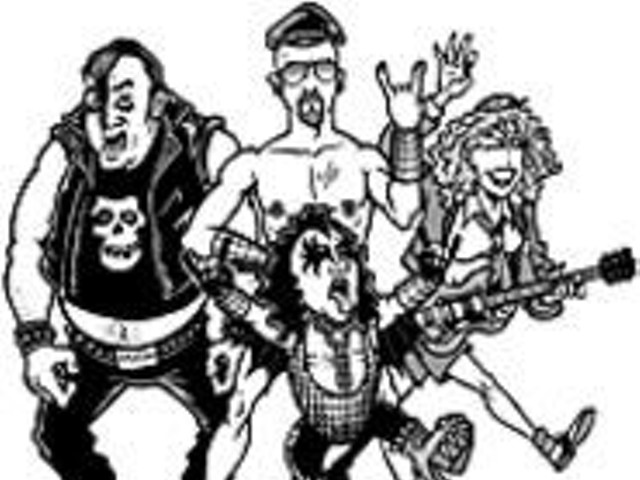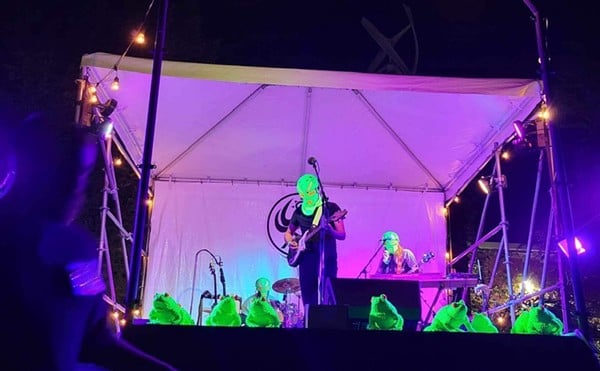2) It's hard to romanticize anything about drummer Tommy Lee's TommyLand, a numbingly idiotic book that might as well be written in all lowercase with emoticons after every sentence. Lee could be a cautionary tale about the dangers of drug use, except I suspect he was always this stupid. The book begins with a conversation between Lee and -- no joke -- his own penis:
"Dick: No matter what you write in this book of yours, I promise you, people will buy it for one reason -- to find out how long I really am."
OK, so his dick speaks the truth. As for the man himself, Lee offers such aphorisms as "A good idea to fire up your relationship is to drive down the highway at about 65 mph and have sex with your girl." Apparently he doesn't drive a standard. Mr. Lee also suggests men shave their own pubes, recommends foursomes over threesomes (so no one's left out) and claims cum tastes better if you drink pineapple juice beforehand. Worse, Lee has next to no insight (or memory) regarding his high-profile relationships with Pamela Anderson or Heather Locklear, although there is one figure from his past he remembers: "One thing I don't miss about being in Mötley Crüe is seeing Vince [Neil]'s bloated, disrespectful, fucking ass every day." Oooh, burn. Except Lee comes across as an unstable sex addict who stalks his way into girls' hearts. If you're curious about Mötley Crüe, I suggest VH1. If you're curious about sex, I suggest a more reliable source -- like the boys' locker room.
3) The much-anticipated Wilco Book makes no mention of frontman Jeff Tweedy's drug addiction to prescription painkillers. In fact, it stays mum on almost all of Tweedy's personal life. Instead the book examines components of the band's world -- their loft, their instruments, their methods of songwriting -- in the hopes that these tiny snapshots will add up to a larger whole. So here we find pages upon pages of curious doodlings and photos of drumsticks, a scratchy old bass, National Geographic spines. Personally, I'd rather read Tweedy's juicy tell-all. In lieu of that, however, I'll have to make do with the revelation that the drum in "I Am Trying to Break Your Heart" is actually a hubcap and that Tweedy challenged himself to write A Ghost is Born entirely in third person. It's terribly indulgent, and yet it seems to be the way Tweedy knows how to communicate -- like a guy who can't stop relating everything in his life to sports scores. -- Sarah Hepola
Who's the Bastard?
Press releases are self-serving and a little icky by nature. But someone at INDIEgo Promotions ought to get a special award for a recent release concerning its client, Brooklyn rapper BeKay, and the death of Old Dirty Bastard. Sent out just days after Dirt's death, it claims to be a tribute to the deceased rap star, but you can practically hear the Champagne corks popping in the background. The ODB appears on a track on BeKay's upcoming album, a fact that the press release won't let you forget for a second. One quarter eulogy, three quarters sales pitch, the release is riddled with caring, mournful sections like this:
"Recorded earlier this year, ODB's dynamic vocals are a huge part of the action on fellow Brooklyn native BeKay's new disc The Future of Hip Hop is Now, with ODB featured prominently on the stand-out track 'Where Brooklyn At?' The disc was released earlier this month on TSOB (The Sound of Brooklyn) Records and is currently being serviced to national radio, retail and press by Denver's INDIEgo Promotions."
Yes. We feel your pain. All that's missing is a "ka-ching!" To his credit, BeKay isn't quoted in the release, and his album isn't half bad. But for the publicists, a little advice our grandma gave us: If you're going to hump a corpse, do it in the dark. -- Jordan Harper
In Music News...
Hot on the heels of Rolling Stone magazine's list of the greatest songs ever, which placed "Like a Rolling Stone" in the No. 1 slot and a Rolling Stones song ("Satisfaction") right behind it, Time magazine has countered with a list of its own. Coming in at No. 1 in the venerable weekly newsmagazine's roundup is the Chambers Brothers' classic "Time Has Come Today" with its groundbreaking middle section that features the word "time" echoing over and over and over. Coming in a close second is The Time's early-'80s hit, "Get It Up," followed by the Steve Miller Band's "Fly Like an Eagle" with its famous "time keeps on slippin'..." refrain. The issue hits newsstands early next week.-- Tom Carlson





